Iran To Approve Budget To Counter What It Calls ‘Iranophobia’

Following warnings issued by the western countries about traveling to Iran, the Islamic Republic is to allocate some budget to “counter Iranophobia” in near future.

Following warnings issued by the western countries about traveling to Iran, the Islamic Republic is to allocate some budget to “counter Iranophobia” in near future.
Iran’s Deputy Tourism Minister Ali-Asghar Shalbafian said Saturday that suggestions have been made for a line of credit for next Iranian year beginning on March 21.
However, he mentioned until the end of current Iranian year on March 20, 2023, the tourism ministry must go ahead with a “limited budget”.
Amid more arrests of dual nationals with Western passports by the Islamic Republic in recent months, several countries have issued warnings to their citizens against traveling to Iran.
The United Kingdom, United States, France, Sweden, Netherland, and Canada advised their nationals not to travel to the Middle Eastern country due to “insecurity” since the nationwide anti-government protests began in Iran in mid-September.
Fearing arrest by Iranian authorities, most foreign tours booked for the New Year and January in popular historic cities have been canceled.
In early November the chairman of the board of Iran's Tour Guides Association, Mohsen Haji-Saeed said some tourists seen in the wrong places and at the wrong time were considered as “spies” and that some foreign nationals had been detained only for taking photographs of the protests “out of curiosity”.
On September 30, Iran’s Intelligence Ministry announced the detention of nine foreign citizens from Germany, Poland, Italy, France, the Netherlands and Sweden. The ministry alleged those arrested had been "on the stage or behind the scenes" of the recent protests.
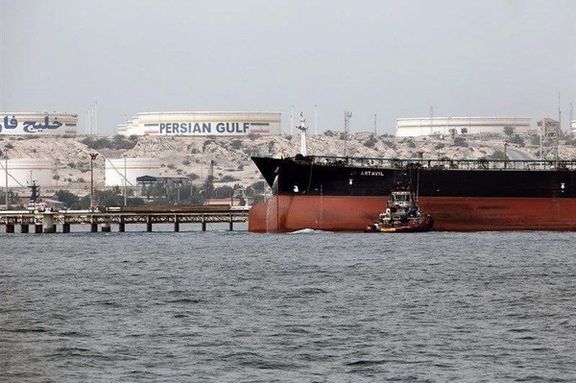
Iran’s income from crude oil exports will substantially decline in 2023, according to a report in the official government news website, IRNA.
The Islamic Republic says that its oil export revenues were around $37 billion in 2022, higher than in 2021 and substantially more than in 2020, when it sold much less oil to China.
IRNA says that because of weaker global demand in 2023, Iran’s exports are estimated to reach $27.3 billion, around $10 billion less than in 2022.
Russia hit by sanctions has significantly increased cheap oil exports to China, becoming a competitor to Iran, although they are military and political allies.
Iran plans its budget according to expected oil revenue since it covers around half of all government financial needs. This year, the government has not published its budget outline yet for the next Iranian year that starts on March 21, 2023.
Already, Iran’s currency has experienced a shocking decline since September, falling from around 310,000 rials to the US dollar to more than 400,000, because of a huge rise in the money supply as the government prints more banknotes to pay its expenses.
Tehran keeps oil export and income figures a state secret and estimates are often offered by OPEC or other international organizations. It is believed that Iran offers hefty discounts to its main customer China, which allows its small refineries to import Iranian crude despite United States sanctions.
A drop in oil in 2023 will have a significant negative impact on the economy, leading to more money being printed by the government and higher inflation.
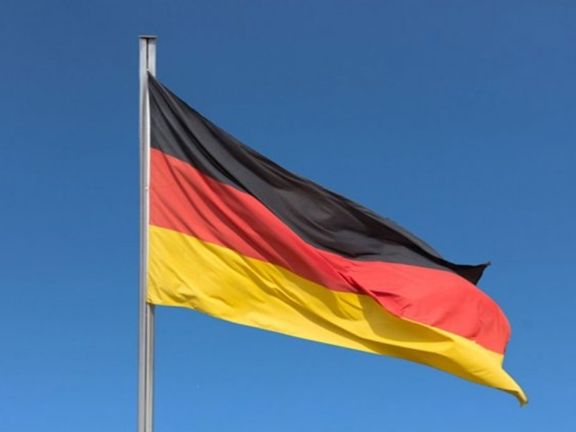
German media say investigations are underway about the role of nearly a dozen Iran IRGC-linked people who are accused of launching attacks on Jewish centers.
Die Welt daily wrote Thursday that Iran’s Revolutionary Gurad manages such operations outside of Iran by hiring criminals.
Police has now launched an investigation to find out more about a terrorist cell in North Rhine-Westphalia, said Welt, adding that one of the suspects had been in radical circles for some time.
Germany and the European Union are discussing the listing of the IRGC as a terrorist organization for its role in violence on protesters in Iran.
In November, an unknown person fired several times at the door of a synagogue in downtown Essen west of Germany.
Nobody got hurt, but the investigators assume the act was part of a series of anti-Semitic attacks probably launched by a cell of terrorists managed by the IRGC, the report said.
Last month, a German TV channel reported the country's security institutions believe the Revolutionary Guard is behind the attacks on Jewish centers in the country.
On November 18, a German-Iranian was detained on suspicion of committing arson at a synagogue in the city of Bochum in Germany.
Local police suspected that the man is connected to Ramin Yektaparast, the founder of the Hell’s Angels group in the city of Mönchengladbach.
German Media reported Yektaparast fled to Iran last year to escape trial for the brutal murder of another member of the gang in 2014.
The suspect might also have been responsible for the attack on the old synagogue in the city of Essen, said German officials.
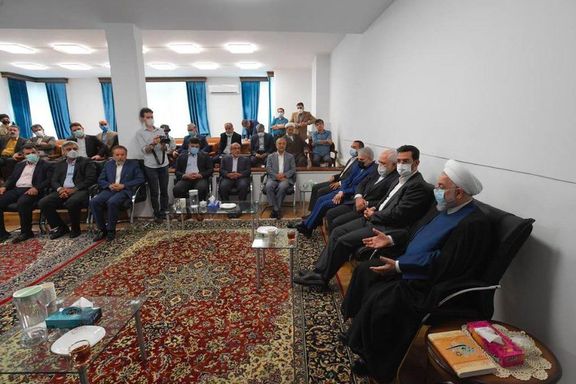
Former Iranian President Hassan Rouhani, who has been mostly silent after he left office in 2021, started to comment on domestic political affairs last week.
Some observers, including a commentary in the leading reformist newspaper Etemad asked whether Rouhani has started a gamble to ensure his political comeback by returning to newspaper headlines after several months. The daily also pointed out in the commentary entitled "Rouhani's rough path to a comeback," that his comments have triggered radical attacks by Iran's conservatives.
Entekhab News, a centrist news outlet close to Rouhani quoted him on December 28 as saying: "I have conveyed some suggestions to the Supreme Leader both in writing and over the phone." Meanwhile, Sara Massoumi, a senior journalist in the reformist daily Etemad on the same date quoted Rouhani as saying: "Some people think that interaction with other countries will lead to infiltration into the Iranian political system. This is not true. It is isolation that leads to infiltration." He added: “In my government we worked hard to keep the JCPOA alive regardless of many attacks on us. We saved the JCPOA by freezing it. The current government could have benefitted from the JCPOA if it wanted to."
According to Etemad, although Rouhani has been silent during the past 18 months except for sending occasional condolence messages, members of the government and other hardliners in Iran often blame him for the country's current problems. Others say that attacks on Rouhani are in fact conservatives’ way of supporting Raisi who is often criticized for his government's weak performance and the deteriorating economic situation.

During the past week, some Iranian politicians suggested that Rouhani might be willing to take part in the parliamentary elections in early 2024. Meanwhile Rouhani and other Iranian politicians have been under pressure by hardliners to support the government and the entire Iranian political system which has been under attack by protesters.
As part of those pressures, Raisi said earlier this week: "Many political figures and regime insiders failed to fulfil their responsibility during the protests." The conservatives reminded that Rouhani's silence is in contrast with his position during the 2019 protests when as president he called for identifying and punishing those who protested to a sudden hike in the price of gasoline.
However, Rouhani's meeting with his former cabinet ministers and aides on December 26 indicated that he is looking for a political comeback with an eye on the impact of the ongoing protests.
During the meeting he extensively talked about the role of women in Iran and their status in Islam. In the same meeting, he also spoke about the JCPOA and how Iran could have benefitted from it had the current government not opposed a deal. Both subjects were likely aimed at bringing Rouhani back to the headlines, and they did.
Nonetheless, although Rouhani tried to appease Khamenei in his remarks, hardliners launched an immediate attack on him saying that his remarks about women showed his liberal views against Islam. Iranian hardliners use the word "liberal" as an insult rather than a political label. Hard-line Mashregh News close to Iranian security forces even said that Rouhani's views were a deviation from the Islamic Republic's official rhetoric.
Farda News, another conservative outlet close to parliament speaker Mohammad Bagher Ghalibaf accused Rouhani of "distorting the truth" and "trying to portray the Raisi administration as a weak government only to conceal his own government's weakness."
Rouhani's possible response to these critics will show if he is really interested in a political comeback.
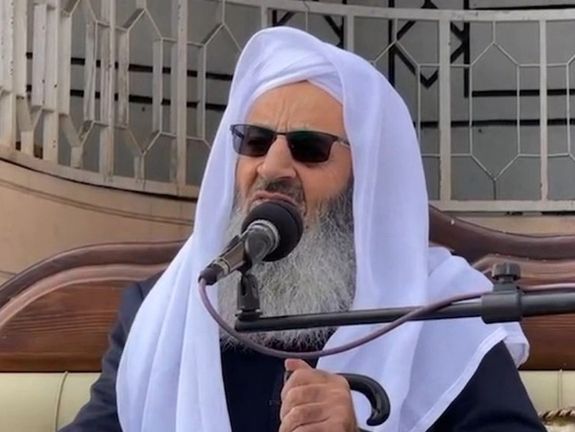
A top Sunni Muslim cleric in Iran has talked about love among all peoples and the importance of women’s rights, in an unprecedented sermon opposing the Shiite regime’s policies.
Several cities in the province of Sistan-Baluchestan, where most Sunni Baluch people live, were scenes of protests against the Islamic Republic on Friday while the regime also organized pro-government rallies in many cities across the country.
This was the 13th consecutive Friday that people in the Sunni-majority cities such as the provincial capital Zahedan and Khash held gatherings and chanted slogans against Supreme Leader Ali Khamenei and the Revolutionary Guard. As usual people poured into streets following Friday prayers.
Mowlavi Abdolhamid, the top religious leader of the Sunni Baluch, led the Friday prayer in Zahedan, and during his sermon criticized the regime’s arrest, sentencing and killing of children.
Elsewhere in his sermons, Abdolhamid debunked the Islamic Republic’s accusation of separatists among the protesters in Sistan and Baluchistan, saying that "We are staunch opponents of separatism. Baluch, Kurd, Arab, Persian, Turk, Turkmen, Lor, Gilak and all other ethnic groups are against separatism.” “All Iranians are one and together. Today, Iran smells of love," he added.
"We sympathize with all Iranians and all Iranians are dear to us; Muslims and non-Muslims, we must respect human rights and humanity. Jews, Christians, Baha'is and others should enjoy human rights. The law has not taken away the nationality of any person; even if he does not accept God," he said.
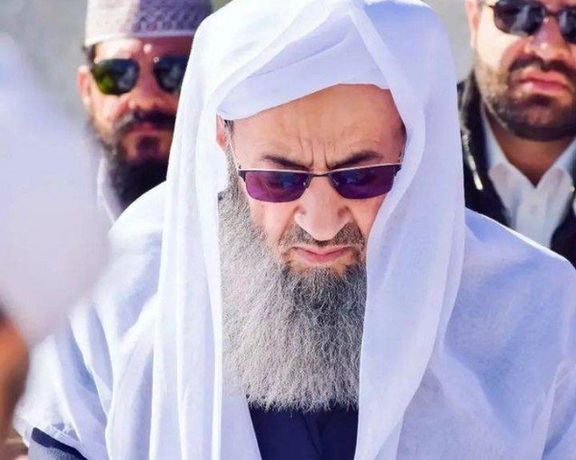
Pointing out that Baha'is are being persecuted by the Islamic Republic, Abdolhamid called for respect for the rights of "all Iranian citizens." Touching on the issue of apostasy verdicts for the Baha'is, he said that "The new generation of Baha’is were not Muslims who wanted to divert from Islam. They were born non-Muslims so they cannot be sentenced to apostasy."
Fereydun Vahman, Professor Emeritus at Copenhagen University, in an interview with International Friday praised Abdolhamid’s remarks and said he is a rare unifying force among Iran’s religious figures. He also hailed his ideas about equality of women and men as well as the equal rights for Baha’is.
Contrary to the Sunni cleric, Supreme Leader Ali Khamenei’s representatives who led Friday prayers across the country, tried to focus on the pro-government commemorations, known in the state media as the occasion of “Day 9 Epic”, the ninth day of the Persian calendar month of Day, which falls on December 30.
Another issue discussed by Khamenei’s representatives – the so-called Friday prayer leaders – was the third death anniversary of Lieutenant General Qassem Soleimani, the former commander IRGC’s extraterritorial Quds Force. On January 3, 2020, the United States killed Soleimani, as well as the deputy commander of Iraq's popular mobilization units, Abu Mahdi Al Muhandis, in a drone strike near Baghdad International Airport.
The contents of Friday Prayer sermons delivered by clerics appointed by Khamenei in various cities are dictated by two state bodies reporting to his office, officially known as "The Policy-making Council for Friday Prayer Imams" and the "Friday Prayer Headquarters," both dominated by hardliner clerics.
Firebrand Iranian cleric Ahmad Khatami, a member of the Guardian Council, claimed that the Islamic Republic is “invincible,” saying that “dictators want to achieve their goals under the guise of democracy and the defense of women's rights and freedom." He added that the US’ intention to liberate women is to enslave them.
He also described the current wave of protests – which he calls riots – as the deepest conspiracy facing the regime. "In the events, for the first time, the Supreme Leader was insulted, which is actually insulting religion.” Khatami was referring to derogatory slogans chanted by protesters against Khamenei, that anger his religious followers.
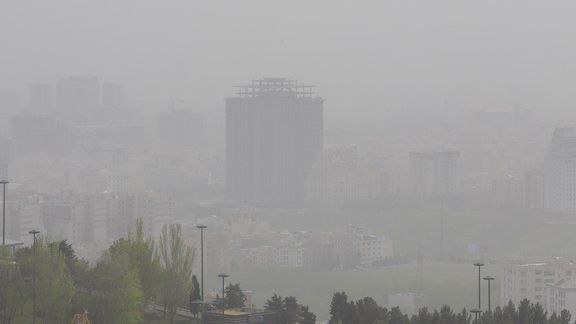
Air pollution in Iran’s capital Tehran and several other cities has reached alarming levels, prompting the government to issue warnings a close some schools.
Iran Meteorological Organization (IMO) on Friday ranked many urban areas as orange or red from Friday December 30 to January 1, specially in Tehran and nearby cities.
According to local media, the government continues to burn mazut at power stations, a dirty oil product banned in most countries. The country usually faces natural gas shortages in winter months, because of higher home consumption. As a result, the decaying energy sector resorts to using mazut with an immediate impact on air pollution.
IMO warned citizens that air quality in many cities is deemed to be harmful or dangerous. These include Tehran, Karaj, Esfahan, Arak and Tabriz. Local officials have demanded that the government stops using mazut, but that could lead to blackouts.
Iran has the world’s second largest natural gas deposits but is unable to boost production because of lack of capital and Western technology. Government officials have said that the country needs to invest $40 billion in modernizing and expanding its gas extraction facilities, but most are in the Persian Gulf and need Western technology.
Due to its anti-West foreign policy and an expanding nuclear program, Iran is under US sanctions and cannot borrow money or technology from most of the world.